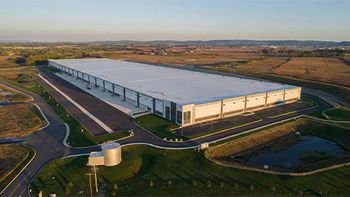
- Pharmaceutical Commerce - March/April 2016
A Conversation with Matt Wallach, Veeva Systems
Veeva Systems, founded in 2007, took the life sciences industry by storm as it introduced one of the first cloudbased customer relationship-management systems, Veeva CRM, and rode the wave of the industry’s adoption of iPads at the time. That software is now the market leader in the US; in the meantime, Veeva opened offices in Europe, Asia and Latin America, and grew to more than 1,300 employees. It had a successful IPO in 2013 and currently sports a market capitalization of around $3 billion. It now has four product lines: CRM, Vault (a platform to store documentation); Network (
Matt Wallach co-founded the company with another industry veteran, Peter Gassner (left, in photo). Pharmaceutical Commerce sat down with Matt to find out where Veeva is going, and what’s in store for life sciences IT. Here’s what he had to say.
1) It might sound like an old record being replayed at this point, but let’s go over the transformation that Veeva has accomplished in getting pharma companies into cloud computing. Are there still older, client-server based systems that Veeva is replacing? Has the pharma industry become fully comfortable with putting its data in the cloud?
When we launched Veeva in 2007, just before the first iPhone hit the market, the life sciences industry had not yet started to adopt cloud computing solutions in any meaningful way. Companies still utilized client-server and hosted IT systems to run all their major operations across commercial, medical, quality, clinical and regulatory. At the time, many legal, compliance and IT teams were wary of data security and validation in the cloud. An equal barrier to adoption was the fact that the cloud computing solutions available were not tailored to the specific requirements of the life sciences industry. Fortunately, so much has changed since those early days of cloud.
Over the last nine years, Veeva has helped to educate the industry about the advantages of cloud computing, even upending previously held viewpoints by demonstrating how these new solutions provide enhanced data security and streamline validation efforts. We made a conscious decision to “verticalize,” which I’ll explain in a minute. To that end, we recruited highly specialized industry experts and listened closely to all of our life sciences customers to develop technology solutions specifically and uniquely designed to meet their needs. The first enterprise-wide cloud computing projects at life sciences companies began in 2008 with the adoption of Veeva CRM for customer relationship management (CRM). These early customers quickly realized the tremendous benefits of modern cloud computing and word spread quickly. As Veeva gained success around the world, the door also opened for other great cloud
companies, such as salesforce.com, Workday and ServiceNow.
Today, most life sciences CIOs have a “cloud-first” strategy. Long gone are the fears of putting data and documents outside the firewall as companies have adopted cloud computing across the enterprise for CRM, data management, clinical trial management, content management, human resources, service management and others. The move to the cloud is not merely a trend…it is how companies operate today and will be well into the future.
2) A follow-on question: In looking at multiple cloud-based IT vendors, what differentiates them? What’s Veeva’s competitive advantage?
I’ve always said, “Just because it’s cloud doesn’t mean it’s good.” Once Veeva started to have broad success, many companies started to market their legacy solutions as “cloud,” “cloud-based” or “hybrid cloud,” but often these were cleverly disguised hosted solutions. One provider, in fact, had published a white paper on its website for weeks entitled “Why the Cloud Doesn’t Work for Life Sciences CRM,” but—all of a sudden—the company changed gears and announced their new cloud solution for life sciences CRM. Huh? We saw this type of suspect rebranding all the time, but none of these companies were successful delivering genuine cloud solutions.
Turns out that one of the most important things for a cloud solutions provider is its year of incorporation. If the provider started too early and already had a legacy client-server solution in place with its customers, the provider remained too dependent on this old model to change. Real cloud software is multitenant, so the technology providers that built multitenant solutions from the ground up during that first year were—and continue to be—the only ones that had a chance at success.
Veeva’s competitive advantage began with a core team of Silicon Valley engineers who truly understood multitenancy and cloud computing. My co-founders, Peter Gassner and Mitch Wallace, were early employees at salesforce.com and deeply understood how to build a company around multitenant software. From these technology roots, Veeva cultivated a rich team of life sciences experts who delivered breakthrough solutions that were faster, better and cheaper than the alternatives. And, because of the nature of cloud computing, all of our solutions were constantly upgraded—three times or more every year—so we were able to innovate faster than our competition.
Today, Veeva offers four product lines to the life sciences industry, all deeply tailored to meet the specific functional and compliance requirements of our customers. We also invest heavily to seamlessly connect our solutions, saving our customers tens of millions of dollars every year in integration costs.
3) Lately, Veeva has been promoting the concept of the “Industry Cloud.” How is that different from specific cloud-based offerings in CRM, document management, etc.?
Traditionally, industry-specific solutions were either niche applications, focused on a narrow set of problems, or variants of an existing horizontal product serving many industries. “Industry cloud” solutions, on the other hand, go deep and broad, providing cloud technology, business processes, data and services uniquely tailored to suit the needs of one industry or business sector; in a word, “verticalization.” Industry cloud companies, like Veeva, offer a suite of products that help an industry across a range of their most crucial business processes.
With critical mass of an industry cloud solution, you can provide greater depth of expertise and insights within your offering than you can with a modified horizontal offering. You can generate unique data available nowhere else. Take Sabre for the airline industry, as an example – Sabre provides the back-end system that powers Expedia, Kayak, Yahoo! Travel and nearly every airline reservation system. Every time an airline adds a flight to the system, it becomes more valuable. And, every time a consumer searches for a flight, the system gets smarter. Sabre knows more about the airline industry in terms of flights, seat preferences, load factors, on-time arrivals, etc. than any company on Earth. Its travel industry cloud has become well known, necessary and appreciated by the entire industry.
At Veeva, we are building the industry cloud for life sciences. We have already been tremendously successful in developing multiple industry cloud solutions, but we are not done. This is a multi-year journey. When we finish, Veeva’s industry cloud will utilize all of our current and future cloud software as well as incorporate more data and services to help companies compliantly bring life-changing products to the right patients faster and more efficiently. Like Sabre’s cloud, ours will organically continue to grow; taking on a life of its own that will become ever more valuable to the entire life sciences industry.
4) Many pharma companies manage their clinical research IT needs separately from their commercial or regulatory IT needs. Yet Veeva is succeeding in offering resources to both communities, having started out in CRM and now Veeva Vault for managing clinical trials and regulatory information. What’s the common ground here, and where is the added value to pharma companies?
Many of the benefits of modern cloud computing solutions are transferrable across every part of a company. End users, managers and administrators all enjoy the reliability, performance, scalability, usability, accessibility and innovation that cloud solutions can deliver. The common ground is a better experience all around, as customers of Veeva and other leading cloud companies have enjoyed.
However, Veeva’s success is more than just the strength of our technology. Veeva has been successful across commercial, medical and R&D because we have built products that specifically meet the business requirements of each area. Our product strategy is to deliver integrated and best-of-breed products for the entire life sciences industry. Many companies deliver either an integrated suite of “good enough” products or a single, best-of-breed solution that fits one need extremely well. Veeva’s strategy is unique in that we are investing heavily in each application area to deliver a best-of-breed solution, while ensuring that every application is part of an integrated suite that provides even more value combined. This singular product strategy has resulted in an uncommonly high level of customer success and loyalty.
5) Similarly, most IT companies want to be either software providers or IT services providers, yet Veeva is doing both, with about a third of its staff in services. What makes this work?
When we started the company, the plan was to build products and have partners deliver all the surrounding services. Very quickly, we learned that our customers wanted more Veeva “skin in the game.” So, initially we built our services division to demonstrate our commitment to customer success but it became much, much more than that.
The Veeva Professional Services team is now the glue that holds us close to our customers around the world. We have many important partner relationships that are also part of the Veeva value proposition, but we always maintain a services footprint with new and existing customers. Veeva Professional Services people are the pollinators of best practices, ensuring that our customers learn from each other’s mistakes and that we fully leverage everything we’ve learned across the industry to streamline projects and operations. This crucial team is part of every major implementation and quickly becomes trusted advisors and partners for our customers.
The services team at Veeva is part of our Industry Cloud vision. Its members are highly valued by customers and will continue to help streamline the operations of the life sciences industry globally.
6) Veeva goes very deep with specific regulatory or validation details in the software that it provides, yet the company also operates globally under many different regulatory frameworks. How do you reconcile these two drivers?
In order to become the world’s leading provider of cloud computing software for the global life sciences industry, Veeva needed to commit to delivering global solutions that were flexible enough to manage even the most stringent local requirements. This has been part of Veeva’s DNA from the very beginning, and one can track the expansion of our product capabilities with our entry into new geographies.
When we entered Europe with Veeva CRM, of course we had to translate the user interface into multiple languages, but we also had to make it work with brick-level data, the sampling regulations that varied widely from country to country, the ability to take orders at pharmacies and countless other local requirements. When we entered Japan, we did so with a “no-compromise” strategy, committing to making Veeva CRM just as good of a fit for the Japanese market as it was for the US and Europe. In China, we are building an entirely new interface to run on WeChat, which is used by merely 800 million people today. (Wink, Wink). And, in the Middle East, the Veeva CRM calendar starts on Sunday instead of Monday.
Veeva delivers this level of geographic product fit across all of our solutions, not just Veeva CRM. We have purposely designed Veeva Vault, Veeva Network, and Veeva Commercial Cloud products to be flexible so they can easily accommodate unique local needs and regulatory requirements.
7) You’ve noted in the past that a key area of pharma innovation is personalized medicine, with genomic and diagnostic data of individual patients influencing drug development. How will this change industry’s data needs, and will Veeva be evolving with those needs?
While many industry participants pine for the good old days of blockbuster drugs, I believe that the golden age of life sciences is just about to begin. The intersection between genomics and biotechnology is creating a stunning new age of personalized medicine that will change life sciences forever…not to mention the lives of humankind. There are companies today curing cancers, blindness, cystic fibrosis and silencing disease-causing genes—and this is just the beginning.
To get there, life sciences companies will retool their regulatory, clinical and commercial operations, and Veeva will deliver the flexible platforms vital to succeed in the new paradigm. And, with three major releases per year for every Veeva product, we are committed to helping our customers stay one step ahead through this incredible transformation. Honestly, I’ve never been more excited about the future of life sciences than I am today.
8) Last year, an industry publication called Veeva an “upstart startup” (whatever that means!), even though the company is now nine years old, has had a successful IPO and operates globally. Is Veeva still being run like a startup?
When we started the company, we wanted to build a great, big company that didn’t suck, but that is very hard work because the inertia of size and success can sweep you along a wave of corporate mediocrity. To combat this potential, we focused on culture early, but not in the way that most companies focus on culture. We never wrote it down. There’s no paper that defines Veeva culture. There is no sign on the wall.
Veera is defined by our employees. Therefore, we focus on hiring and retaining the right people—and creating a company of ‘Veevans.’ Our most important core value is customer success, so we screen people to see if they can put the customer’s success ahead of their own. Then, we teach people why customer success is the right way to build a product, grow a company and progress a career. And we lead by example, every day.
Veeva also has built a diverse set of products, each in a different stage of its life cycle. We have a mature, market-leading product in Veeva CRM. We have a fast-growing product in Veeva Vault that is quickly becoming the market leader. We have Veeva Network and Veeva OpenData that are still neophytes, but show great promise. And, we started Veeva Labs to incubate brand new ideas. So there are lots of people at Veeva who feel like they work at a startup, but with the safety of working for a profitable, growing company. This helps us to recruit more of the right people because we can cater to smart professionals who want to be in every stage of a product’s development cycle.
9) Entrepreneurs are everywhere but few make it as far as you have with Veeva. What do you think are the character traits that you have that are key to be a successful entrepreneur?
When I was 16 years old, I was a passenger in a car that crashed into a telephone pole going 85 miles per hour. Most people would not have survived, but for some reason, I did. Losing my invincibility at such a young age caused me to grow up quickly and to learn to focus on what is most important. For me, that has always been family, honesty and intense dedication to the cause—and I believe these traits have served as the foundation for my success…Veeva’s success, too.
In 2007, I had already served the life sciences industry for almost a decade. I had met executives at nearly every pharmaceutical company worldwide and had worked deep in the trenches doing complex technology implementations. Nobody worked harder than I did during those years. Leaders throughout the industry knew that they could rely on me because I simply never stopped working on an implementation until it worked. As important, I also had a tendency to speak plainly— naturally and boldly “telling it how it is.” I think people found this refreshing and came to respect the unabashed honesty. Combined, these traits of determination, trustworthiness and reliability helped us jumpstart Veeva because people were willing to listen and they believed. Of course, it has also taken the extreme dedication of literally thousands of people to make Veeva the global success that it is today.
10) Have you made any mistakes on this rise to the top? What has your personal journey looked like and how has it aligned with the evolution of your company?
Most certainly, I’ve made my share of mistakes. After my time at Siebel Systems, I joined a small software company in Oregon that I thought we could make great. Little did I know (because my due diligence was lousy), that the company had only enough cash to last 12 months and they were targeting a market too small to fund properly in the first place. I then joined another small company where I just didn’t fit in. But, between these first three endeavors, I had worked in life sciences CRM, clinical trial software, content management, MDM and healthcare reference data. Now, looking across Veeva’s product lines today, it appears that I planned it all perfectly!
Articles in this issue
almost 10 years ago
Spectra Selling Solutions: a new player in contract sales organizationsalmost 10 years ago
Hub Services Special Report 2016almost 10 years ago
Immunoglobulin (IG) drives the blood-plasma therapeutics marketalmost 10 years ago
Agenda set for 2016 HPCLC Conferencealmost 10 years ago
J. Knipper heads CBI conference on sampling managementalmost 10 years ago
3C! Packaging wins certification for private-label print packagingalmost 10 years ago
Pharmaceutical cold chain logistics is a $12.6-billion global industryalmost 10 years ago
Schreiner introduced a double-capping feature to vialsalmost 10 years ago
Specialty pharma becomes 'hub enabled'almost 10 years ago
Use data analytics to monitor 340B discount drug pricingNewsletter
Stay ahead in the life sciences industry with Pharmaceutical Commerce, the latest news, trends, and strategies in drug distribution, commercialization, and market access.




